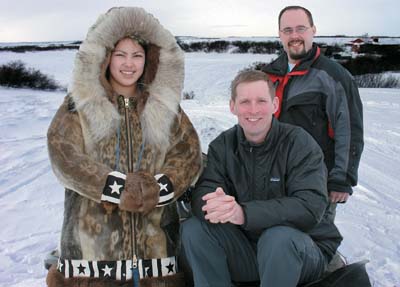 |
 |
| current issue |  |
past issues |  |
send a letter/news |  |
address update |  |
advertise |  |
about us |  |
alumni home |
Alumni Profiles
Medicine MenThe call of the wild lures two UNH alums to the remote Yukon Delta in Alaska
By C.W. Wolff

SNOW JOB: Dan Hartman '88, center, Matt Greenberg '97, right, and co-worker Shannon Day, a Yup'ik Eskimo, outside their health center in Bethel, Alaska. |
Matt Greenberg '97 doesn't like seal meat. "It's as if someone took a piece of liver and painted it black," he says. His colleague, Dan Hartman '88, a former marine biologist, isn't crazy about it either.
But both men and their wives love wild salmon. That's fortunate, since salmon—along with seal, caribou, moose and berries—is a mainstay of the diet of the Yup'ik Indians of southwestern Alaska, where Greenberg and Hartman live and work as doctors.
They came separately to Bethel, Alaska, in the middle of the Yukon Delta National Wildlife Refuge, a roadless area the size of Oregon; they've joked about organizing a two-person alumni chapter. "It's a truly wild place, like an arctic Amazon," says Hartman, who arrived in 2001 and is now the chief infectious disease doctor at the Yukon-Kuskokwim Health Corp.
Greenberg, an emergency room doctor, and his wife, Carolyn, a pediatrician, arrived in 2005 to work in the same hospital. "We came on a whim," says Greenberg. "We wanted to work someplace under-served, and this area is about as close to the Third World as you can get without leaving the United States." It's also perhaps the most intact native culture in the country, with 28,000 natives, a third of whom speak Yup'ik, living in 58 villages spread out across the tundra.
It's a subsistence economy. "When I do home visits in the villages in the spring, I'm likely to see a seal being butchered on the kitchen floor," says Hartman. "In the fall, I'll see geese and ducks hanging over the stove and moose meat in the corner."
They both work long hours, since the hospital is chronically understaffed. A lot of their time is spent on the phone with lay health aides in remote villages, talking them through the treatment of patients, or arranging transportation for seriously ill patients to Anchorage, 340 miles away. Greenberg treats a lot of dog bites, hunting injuries and botulism, the latter the result of a traditional Yup'ik dish—fermented fish heads. Hartman reports that tuberculosis and antibiotic-resistant staph infections are common. "Twenty-six percent of babies have pneumonia before age 1," he says. A chief cause is overcrowded houses, with wood heat and no running water. The traditional community steam baths are another source of infection.
Bethel boasts 20 churches, eight miles of road and an average of 50 inches of snow a year, but it lacks a movie theater or a shopping mall. The most exciting annual events are a dogsled race and a native dance festival. It can feel very isolated, since the only ways in and out are by bush plane, snowmobile or dog sled. The Greenbergs had their first child in February; the Hartmans' two young daughters are already experienced in mushing a dogsled. The chief complaint for both families is the distance from their New Hampshire relatives.
But both love living in a different culture, especially the Yup'iks'. "The people are wonderful. That's why I'm here," says Greenberg. Hartman adds, "I really do feel I'm being of use."
Easy to print version blog comments powered by Disqus
